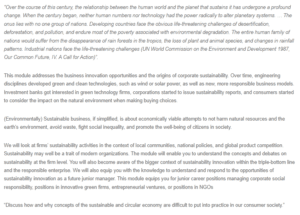Innovation and the Sustainable Organisation
Discuss how and why concepts of the sustainable and circular economy are difficult to put into practice in our consumer society
With global warming, air pollution, water pollution, land degradation, rise in sea levels, deforestation, desertification, and natural disasters becoming commonplace in the 20th century, professionals and leading international organizations have turned their attention to two main concepts: sustainable economy and circular economy. A sustainable economy refers to an economy that is able to cater to the needs and well-being of populations with the least level of environmental harm and amount of resource use (Kruja, 2013, p. 93). In economic terms, for an economy to be truly sustainable, the ecological footprint (or the total demand for natural resources) must be significantly lower than nature’s biocapacity (the supply of renewable resources). On the other hand, a circular economy is defined as having ‘closed loops,’ meaning that raw materials, products, and other elements in the production lifecycle never lose value (Lacy, Long, & Spindler, 2019, p. 75). Most products are recycled at the end of their lifecycle, renewable energy is highly utilized, and ‘systems thinking’ is at the center stage of management.
Despite empirical research proving the ability of the two concepts to lower the overall carbon footprint (particularly from industrial activity and environmental damage), governments and environmentalists are still facing an uphill task in putting into practice the two ideologies in the current consumer society. Several reasons explain why this is so. The first and obvious reason is that modern economies, perhaps because of industrialization, are overproducing and oversupplying what the population can consume, leaving excess products in the market. Researchers argue that this overproduction, especially of agricultural products, is leading to environmental destruction and degradation. In fact, in the U.S., it is estimated that nearly 40 percent of the total food supplied to the market is wasted (Dufalla, 2016). In the United Kingdom, WRAP (2020, p. 1) estimated in 2018 that nearly 9.5 million tonnes of food went to waste within the wholesale and retail sectors, food manufacture, hospitality & food service, as well as homes. Overproduction is not only putting a strain on natural resources but is also affecting the capacity and ability of industries and producers to collect and recycle their waste material, including those used in packaging items, particularly plastic materials.
Apart from overproduction, the high appetite and drive for capital and profits are also negatively affecting the attainment of a sustainable and circular economy. In a capitalist world, each company strives to maximize its profits by using the least possible resources in production and committing fewer funds to sustainable activities, such as lowering the carbon footprint, helping communities grow, rewarding workers, and many others. This is the reason why companies like Coca-Cola, considered the heaviest users of plastic, are investing heavily in modern tools, machines, factories, and other productive resources but show little concern in putting measures in place to recycle their wastes or use renewable materials. Laville Sandra of The Guardian estimates that the giant soft drink company generates nearly 200,000 plastic bottles a minute or 3 million tonnes of packaging annually.
Reference
Dufalla, J. (2016). Agricultural Overproduction and the Deteriorating Environment. E-International Relations. Available through: https://www.e-ir.info/2016/07/07/agricultural-overproduction-and-the-deteriorating-environment/. Accessed 21 Oct. 2020.
Kruja, A. (2013). Sustainable Economic Development, a Necessity of the 21st Century. Mediterranean Journal of Social Sciences, 4(10), pp. 93-98.
Lacy, P., Long, J., & Spindler, W. (2019). The Circular Economy Handbook: Realizing the Circular Advantage. London: Springer Nature.
Laville, S. (2019, Mar 14). Coca-Cola Admits it Produces 3m Tonnes of Plastic Packaging a Year. The Guardian [Online]. Available through https://www.theguardian.com/business/2019/mar/14/coca-cola-admits-it-produces-3m-tonnes-of-plastic-packaging-a-year. Accessed 21 Oct. 2020.
WRAP. (2020). Food Surplus and Waste in the UK – Key Facts. Available through https://wrap.org.uk/sites/files/wrap/Food_%20surplus_and_waste_in_the_UK_key_facts_Jan_2020.pdf. Accessed 21 Oct. 2020.
ORDER A PLAGIARISM-FREE PAPER HERE
We’ll write everything from scratch
Question
“Over the course of this century, the relationship between the human world and the planet that sustains it has undergone a profound change. When the century began, neither human numbers nor technology had the power radically to alter planetary systems. … The onus lies with no one group of nations. Developing countries face the obvious life-threatening challenges of desertification, deforestation, and pollution, and endure most of the poverty associated with environmental degradation. The entire human family of nations would suffer from the disappearance of rain forests in the tropics, the loss of plant and animal species, and changes in rainfall patterns. Industrial nations face the life-threatening challenges (UN World Commission on the Environment and Development 1987, Our Common Future, IV. A Call for Action)”.

Innovation and the Sustainable Organisation
This module addresses the business innovation opportunities and the origins of corporate sustainability. Over time, engineering disciplines developed green and clean technologies, such as wind or solar power, as well as new, more responsible business models. Investment banks got interested in green technology firms, corporations started to issue sustainability reports, and consumers started to consider the impact on the natural environment when making buying choices.
(Environmentally) Sustainable business, if simplified, is about economically viable attempts to not harm natural resources and the earth’s environment, avoid waste, fight social inequality, and promote the well-being of citizens in society.
We will look at firms’ sustainability activities in the context of local communities, national policies, and global product competition. Sustainability may well be a trait of modern organizations. The module will enable you to understand the concepts and debates on sustainability at the firm level. You will also become aware of the bigger context of sustainability innovation within the triple-bottom line and the responsible enterprise. We will also equip you with the knowledge to understand and respond to the opportunities of sustainability innovation as a future junior manager. This module equips you for junior career positions managing corporate social responsibility, positions in innovative green firms, entrepreneurial ventures, or positions in NGOs
“Discuss how and why concepts of the sustainable and circular economy are difficult to put into practice in our consumer society.”

